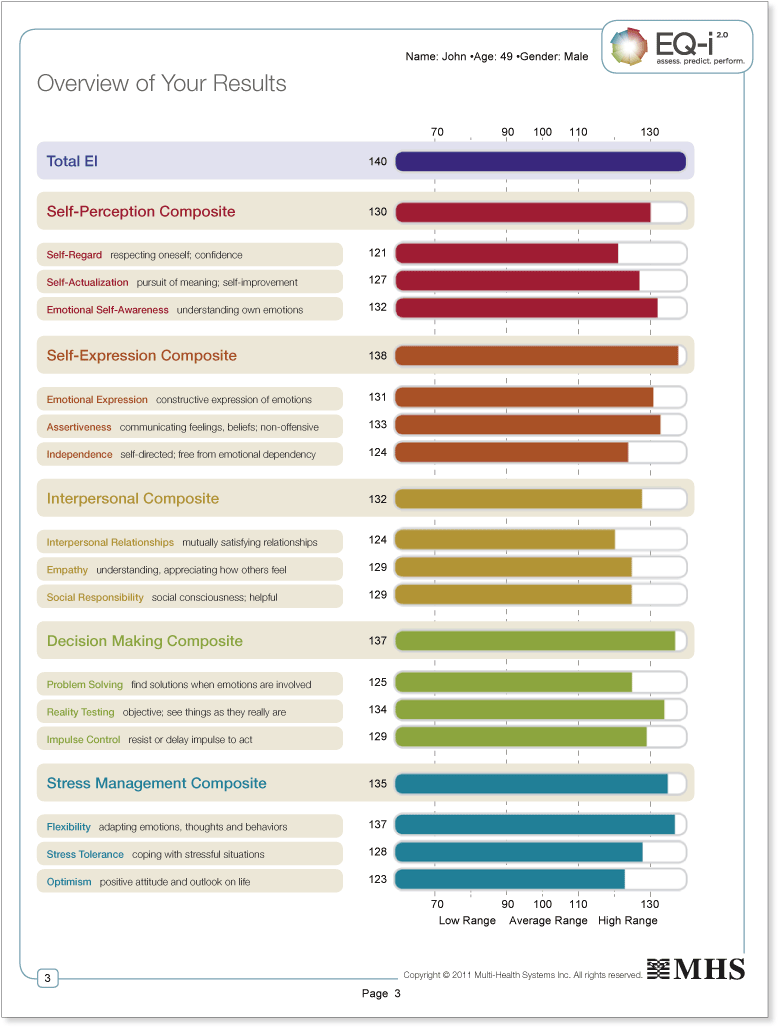Part IV: Using the Results
EQ-i 2.0 Case Studies
Case Study 5
Submitted by: John Elliot
Client Background
John is a successful senior manager. His personal style is poised and pleasant, characterized by high initiative and self-confidence. In general, he is highly regarded by upper management, direct reports and peers. John is extremely articulate and has no problem making himself understood in our discussion. He expresses a tendency to “shoot from the hip” on occasion in his leadership style. However, insight he gained from a recent 360º feedback indicated that his staff saw him as caring and fair. In addition, he is very goal oriented, conscientious and dependable. John describes himself as someone who is comfortable with his influence and demonstrates acute mental agility which helps him develop unique approaches to problem-solving. John indicated that he is able to meet challenges head on and is not intimidated by change and uncertainty that are constants in his work. He indicated that his very strict family upbringing was instrumental in shaping him. He has a sense of right and wrong and is very emphatic in his willingness to only choose what, in his mind, is right. He said that shades of grey are not part of how he sees his world.
John indicated that he started off his work-life as a plumber, but at the age of 34 made a decision to go to university full-time while raising a young family. He was interested in creating a better future for himself and his family that would be afforded by higher education. He indicated that his careful planning was rewarded when he earned a position with a private sector company. He eventually moved into more senior positions with increasing responsibility.
Summary of EQ-i 2.0 Results

John’s scores on the five composite scales were all in the high range. In addition, the subscales were in the high range, indicating someone with a mastery in their emotional skills and the ability to fully understand oneself and use this information to manage emotions productively.
In reviewing John’s results, it was noted that his response style for positive impression was elevated. It was explained to John that this response style may affect the profile’s accuracy and that we needed to discuss the way he responded to the items. John explained that this is not uncommon for him and that he interprets the questions in a logical and precise way; in no way did he feel that his responses were misrepresentations about how he views himself. He used the example of high Self-Regard to clarify this point, indicating that his upbringing and the way he has lived his life has reinforced a high degree of confidence and self-respect. In addition, John indicated that his high moral code, integrity and authenticity matter very much to him. John feels that his responses truly present how he views himself.
John further indicated and recognizes that he has room to improve and that he is willing to strive towards personal improvement. He was most interested in the Interpersonal composite scores. He recognized that in his work setting his particular style does not meet the needs of all of his staff. He has been working on developing a more open approach to discussing differing points of view. He was aware of his tendency to make snap decisions (Impulse Control) and that it often isolates those he works with, leaving them to feel invalidated and misunderstood. As a result, John is committed to consciously improving his approach in this area.
Coaching Approach & Development Strategies
Even though John presented well and was adamant that he did not appraise himself higher than he thought he should, he was still willing to look at possible areas to develop. John indicated that the key to his success as a manager is the success of his staff. He wanted to use the insight gained from the EQ-i 2.0 to help him develop his interpersonal skills. He knew that he was extremely self-aware; however, he recognized that he needed to engage his staff to ensure that he was more inclusive as a manager. It was recommended that John develop a facilitative leadership style by developing a repertoire of neutral questions to promote engagement and enhanced communication. This exercise would help John to develop open and effective communication with more emphasis on listening and less of a need to expedite and solve his staff’s problems. I asked him to pay close attention to body language: his body language and that of those he interacts with. The goal is to reframe, moving away from becoming irritated and more toward becoming curious so he could engage, probe and let his staff explore how they felt. Some feedback in the past indicated his disregard for their feelings in particular situations; this change in behavior will help him address these concerns.
John is committed to providing better communication with a new perspective on his behaviors and how it impacts others. I asked John to chronicle his interactions in a journal so he could review and make adaptations to his leadership style. John agreed that journal writing would allow time for reflection/integration during the course of his day. John was asked to think of the following question when interacting with his staff, “What action can I take to ensure my staff feel listened to?"